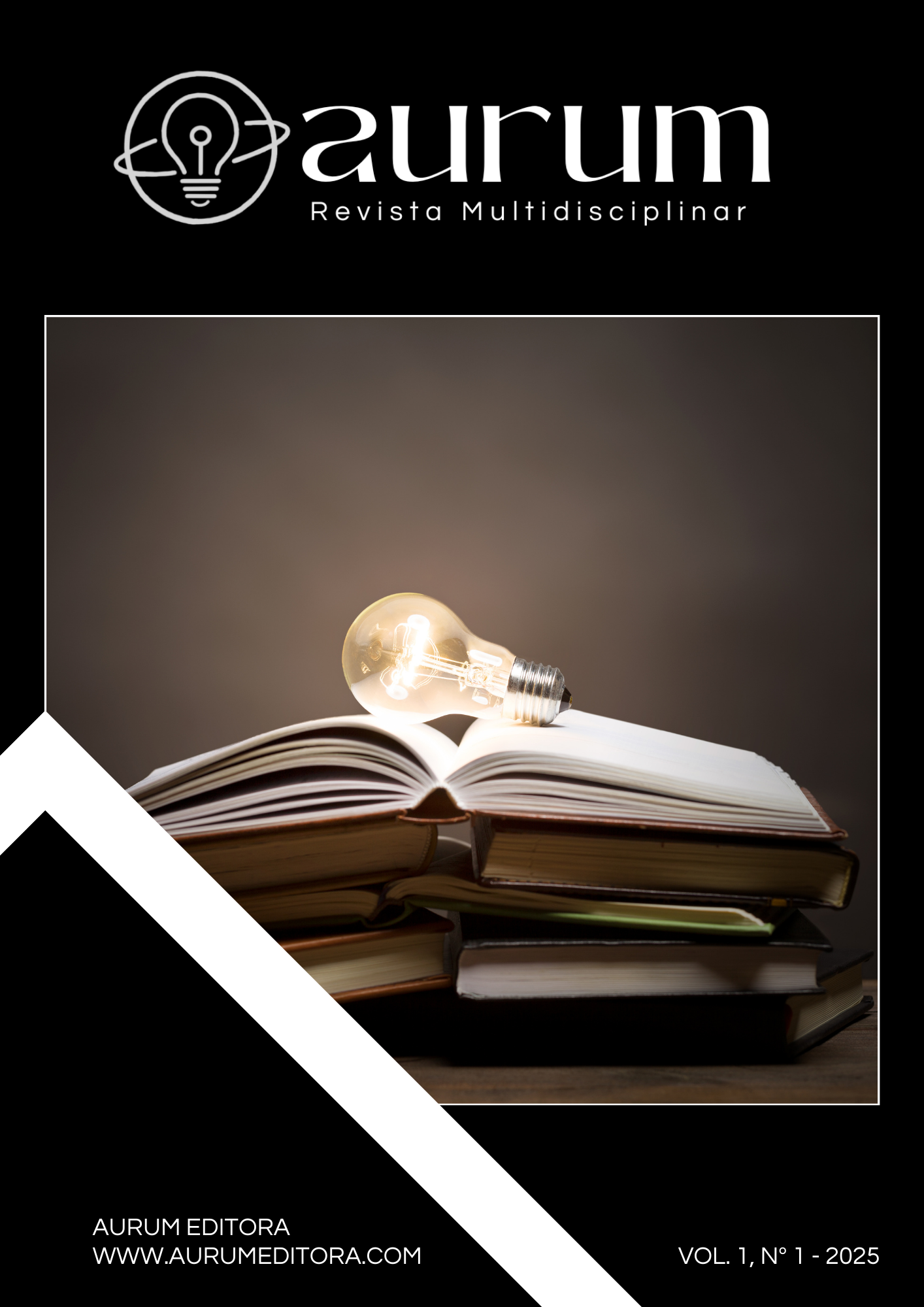A IMPORTÂNCIA DO LÚDICO NA EDUCAÇÃO INFANTIL
DOI:
https://doi.org/10.63330/armv1n1-006Palabras clave:
Educação Infantil, Ludicidade, Aprendizagem, Desenvolvimento Infantil, Práticas PedagógicasResumen
A ludicidade tem sido amplamente reconhecida como um fator essencial para o desenvolvimento infantil, promovendo a aprendizagem de maneira dinâmica e significativa. No contexto da educação infantil, as práticas lúdicas favorecem o desenvolvimento cognitivo, social, emocional e motor das crianças, tornando o ambiente escolar mais inclusivo e estimulante. No entanto, desafios como a falta de formação docente, infraestrutura inadequada e resistência de algumas instituições ainda limitam a implementação efetiva dessa abordagem. O objetivo deste estudo foi analisar a importância do lúdico na educação infantil, destacando seus impactos no desenvolvimento da criança e os desafios para sua aplicação no currículo escolar. A pesquisa adotou uma metodologia baseada em revisão bibliográfica, utilizando artigos científicos e documentos normativos publicados entre 2020 e 2024. Os resultados indicaram que a ludicidade melhora significativamente o desempenho acadêmico, estimula a criatividade e fortalece as habilidades socioemocionais das crianças. No entanto, a formação insuficiente dos professores e a escassez de materiais lúdicos ainda representam obstáculos à sua implementação. Conclui-se que a ludicidade deve ser integrada de forma planejada ao currículo da educação infantil, exigindo investimentos em capacitação docente, políticas públicas de incentivo e maior envolvimento da comunidade escolar. O reconhecimento do brincar como um direito da criança e como uma metodologia de ensino eficaz é essencial para garantir uma educação mais inovadora, acessível e equitativa.
Referencias
ARAÚJO, F. R. D. et al. A ludicidade na educação infantil: a aprendizagem se desenvolve através do ato de brincar. RECIMA21 - Revista Científica Multidisciplinar, v. 4, n. 9, p. e494001-e494001, 2023. Disponível em: https://recima21.com.br/index.php/recima21/article/view/4001. Acesso em: 5 mar. 2025.
BRASIL. Base Nacional Comum Curricular. Brasília: Ministério da Educação, 2017. Disponível em: https://basenacionalcomum.mec.gov.br/. Acesso em: 5 mar. 2025.
CINTRA, R. C. G. G.; OLIVEIRA, E. R.; OLIVEIRA, É. S. A importância da ludicidade na Educação Infantil. Brazilian Journal of Development, v. 8, n. 1, p. 5698-5708, 2022. Disponível em: https://ojs.brazilianjournals.com.br/ojs/index.php/BRJD/article/view/43062. Acesso em: 5 mar. 2025.
CRUZ, A. G. D. F.; KAWAKAMI, A. N. Explorando a ludicidade e a musicalização na promoção da consciência fonológica na educação infantil. Revista OWL - Revista Interdisciplinar de Ensino e Educação, v. 2, n. 2, p. 491-496, 2024. Disponível em: https://www.revistaowl.com.br/index.php/owl/article/view/202. Acesso em: 5 mar. 2025.
FERNANDES, S. L. R. Proposta pedagógica para a educação infantil: a ludicidade como instrumento de aprendizagem. 2022. Disponível em: https://repositorio.ifes.edu.br/handle/123456789/3126. Acesso em: 5 mar. 2025.
HENRICH BARBA, C.; BOLSANELLO, D. E. A ludicidade como facilitadora do processo de ensino aprendizagem. Amazônica - Revista de Psicopedagogia, Psicologia Escolar e Educação, v. 15, n. 1, jan.-jun., p. 234-249, 2022. Disponível em: https://periodicos.ufam.edu.br/index.php/amazonica/article/view/10243. Acesso em: 5 mar. 2025.
LIMA, K. T. S.; LIMA, S. S. C.; JESUS NASCIMENTO, V. Importância da ludicidade na educação infantil. Revista Facimp-Empowerment, v. 1, n. 1, p. 4-13, 2020. Disponível em: http://www.pesquisaemfoco.periodikos.com.br/journal/pesquisaemfoco/article/5e63c1f40e88253d3ddc2af6. Acesso em: 5 mar. 2025.
MELO RODRIGUES, A. M. et al. Desenvolvimento da leitura na educação infantil: o papel da ludicidade. Research, Society and Development, v. 11, n. 1, p. e52011125228-e52011125228, 2022. Disponível em: https://rsdjournal.org/index.php/rsd/article/view/25228. Acesso em: 5 mar. 2025.
MODESTO, A. P. S.; SILVA, K. G. O.; FUKUI, R. K. A promoção da ludicidade no processo de aprendizagem. Revista Psicologia & Saberes, v. 9, n. 14, p. 59-69, 2020. Disponível em: https://revistas.cesmac.edu.br/psicologia/article/view/1151. Acesso em: 5 mar. 2025.
OLIVEIRA, N. B. A. A importância da ludicidade na educação infantil. 2023. Disponível em: https://repositorio.ifes.edu.br/handle/123456789/4081. Acesso em: 5 mar. 2025.
REIS, M. L. S. Ludicidade na educação infantil: Aprendizagem e desenvolvimento no Centro de Educação Infantil em Codó, Maranhão. 2020. Disponível em: https://monografias.ufma.br/jspui/handle/123456789/4592. Acesso em: 5 mar. 2025.
SALES, N. S. A ludicidade na educação infantil: a influência do lúdico na aprendizagem. 2020. Disponível em: https://repositorio.ufpb.br/jspui/handle/123456789/17950. Acesso em: 5 mar. 2025.
SANTOS BARBOSA, B.; POLETTO, L. Ludicidade e educação: o papel dos brinquedos e brincadeiras no desenvolvimento da aprendizagem. Educação e Cultura em Debate, v. 8, n. 1, p. 200-221, 2022.
SANTOS PEREIRA, M. F.; LIMA, A. P. T.; SANTOS PEREIRA, A. M. A importância da ludicidade na educação infantil para o processo de ensino aprendizagem. Brazilian Journal of Development, v. 6, n. 10, p. 82320-82329, 2020. Disponível em: https://ojs.brazilianjournals.com.br/ojs/index.php/BRJD/article/view/18915. Acesso em: 5 mar. 2025.
SILVA, N. M. A importância do lúdico no processo de ensino aprendizagem na educação infantil. 2022. Disponível em: https://dspace.uniceplac.edu.br/handle/123456789/2044. Acesso em: 5 mar. 2025.
TREVEZANI, E. et al. A importância da ludicidade na educação infantil: Revisão de literatura. Facit Business and Technology Journal, v. 1, n. 22, 2021. Disponível em: http://revistas.faculdadefacit.edu.br/index.php/JNT/article/view/804. Acesso em: 5 mar. 2025.
Descargas
Publicado
Número
Sección
Licencia
Derechos de autor 2025 Carlos Alexandre Caxito dos Santos e Joana Venancio (Autor)

Esta obra está bajo una licencia internacional Creative Commons Atribución-NoComercial-SinDerivadas 4.0.





